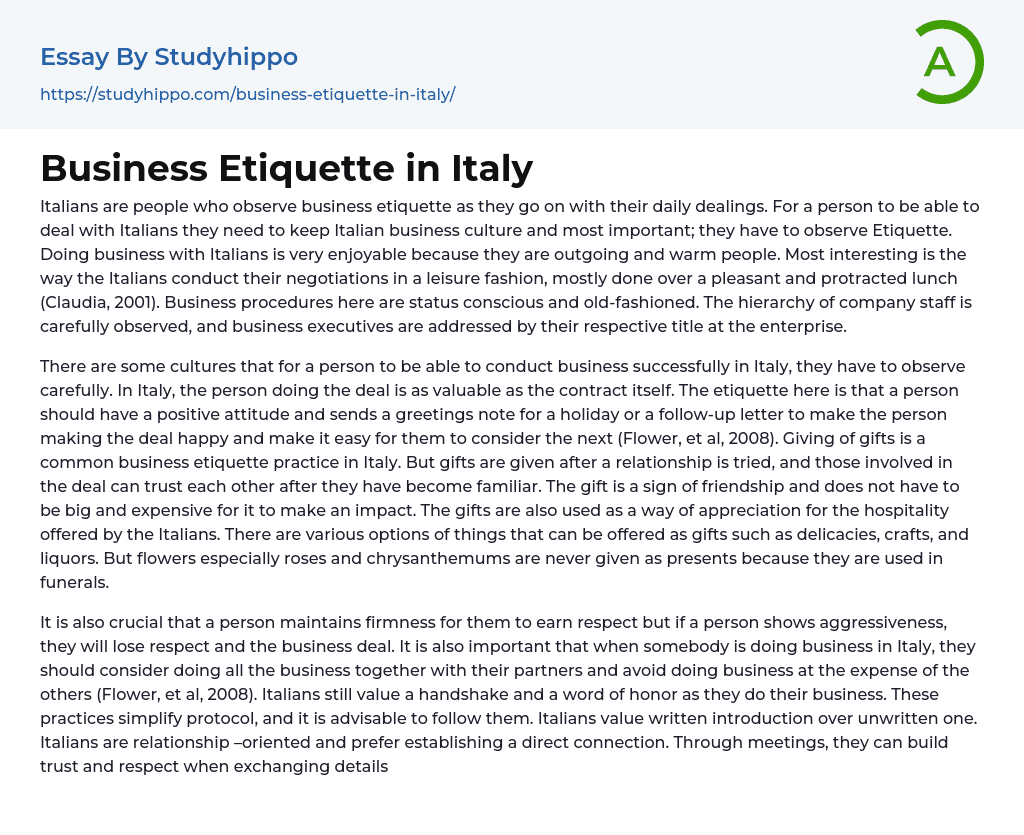Italians are people who observe business etiquette as they go on with their daily dealings. For a person to be able to deal with Italians they need to keep Italian business culture and most important; they have to observe Etiquette. Doing business with Italians is very enjoyable because they are outgoing and warm people. Most interesting is the way the Italians conduct their negotiations in a leisure fashion, mostly done over a pleasant and protracted lunch (Claudia, 2001). Business procedures here are status conscious and old-fashioned. The hierarchy of company staff is carefully observed, and business executives are addressed by their respective title at the enterprise.
There are some cultures that for a person to be able to conduct business successfully in Italy, they have to observ
...e carefully. In Italy, the person doing the deal is as valuable as the contract itself. The etiquette here is that a person should have a positive attitude and sends a greetings note for a holiday or a follow-up letter to make the person making the deal happy and make it easy for them to consider the next (Flower, et al, 2008). Giving of gifts is a common business etiquette practice in Italy. But gifts are given after a relationship is tried, and those involved in the deal can trust each other after they have become familiar. The gift is a sign of friendship and does not have to be big and expensive for it to make an impact. The gifts are also used as a way of appreciation for the hospitality offered by the Italians. There are various options of things that can be offered as gifts such as
delicacies, crafts, and liquors. But flowers especially roses and chrysanthemums are never given as presents because they are used in funerals.
It is also crucial that a person maintains firmness for them to earn respect but if a person shows aggressiveness, they will lose respect and the business deal. It is also important that when somebody is doing business in Italy, they should consider doing all the business together with their partners and avoid doing business at the expense of the others (Flower, et al, 2008). Italians still value a handshake and a word of honor as they do their business. These practices simplify protocol, and it is advisable to follow them. Italians value written introduction over unwritten one. Italians are relationship –oriented and prefer establishing a direct connection. Through meetings, they can build trust and respect when exchanging details concerning the business proposal. In Italy, courtesy is a quality that employers value and observe carefully.
The business dress code is also a major etiquette factor in Italy. Italians consider a fashionable style as a sign of wealth and success. Characteristics of stylishness are high-quality fabric dresses like the lightweight silk and wools (Claudia, 2001). Often, stylish brand accessories and clothing are given considerable attention. For businessmen, black color is expected for the most part. Business ladies wear modest and elegant skirts or pants suits, accessorized with makeup and jewelry. It is advisable that you avoid fashion competition when doing business in Italy. And as part of the Italian business culture, punctuality is not a priority (Claudia, 2001). You should be ready for some delays, and a person should be patient to make it in business with
Italians. A small delay is not taken as a sign of lack of respect. Some flexibility is built into a deadline. For a person to be able to do business with Italians, it is advisable that they first study the business etiquette and culture of Italian business community.
References
- Claudia, G. (2001). Passport Italy: Your Pocket to Italian Business, Customs, and Etiquette. US: World Trade Press
- Flower, Raymond, Falassi, and Alessandro. (2008). Culture Shock Italy: A Survival Guide to Customs and Etiquette. Singapore, Marshall Cavendish.
- 1984 essays
- A Farewell to Arms essays
- A Good Man Is Hard to Find essays
- A Hanging essays
- A Lesson Before Dying essays
- A Long Way Gone essays
- A Rose For Emily essays
- A Separate Peace essays
- A Tale Of Two Cities essays
- A Very Old Man With Enormous Wings essays
- Adventures Of Huckleberry Finn essays
- Alice in Wonderland essays
- All Quiet on The Western Front essays
- Allegory of the Cave essays
- An occurrence at owl creek bridge essays
- Animal Farm essays
- Anthem essays
- Antigone essays
- Arthur Conan Doyle essays
- As I Lay Dying essays
- Atticus Finch essays
- Barn Burning essays
- Battle Royal essays
- Beauty and The Beast essays
- Beloved essays
- Boo Radley essays
- Brave New World essays
- Candide essays
- Castle essays
- Characters In Hamlet essays
- Characters In Romeo And Juliet essays
- Christmas carol essays
- Chronicle of a Death Foretold essays
- Cinderella essays
- Crime and Punishment essays
- Daisy Miller essays
- Death of a Salesman American Dream essays
- Desdemona essays
- Diary Of A Wimpy Kid essays
- Dracula essays
- Dubliners essays
- Emma essays
- Ender'S Game essays
- Ethan Frome essays
- Eveline essays
- Fahrenheit 451 essays
- First-Person Narrative essays
- Fish Cheeks essays
- Frankenstein essays
- Genesis essays




